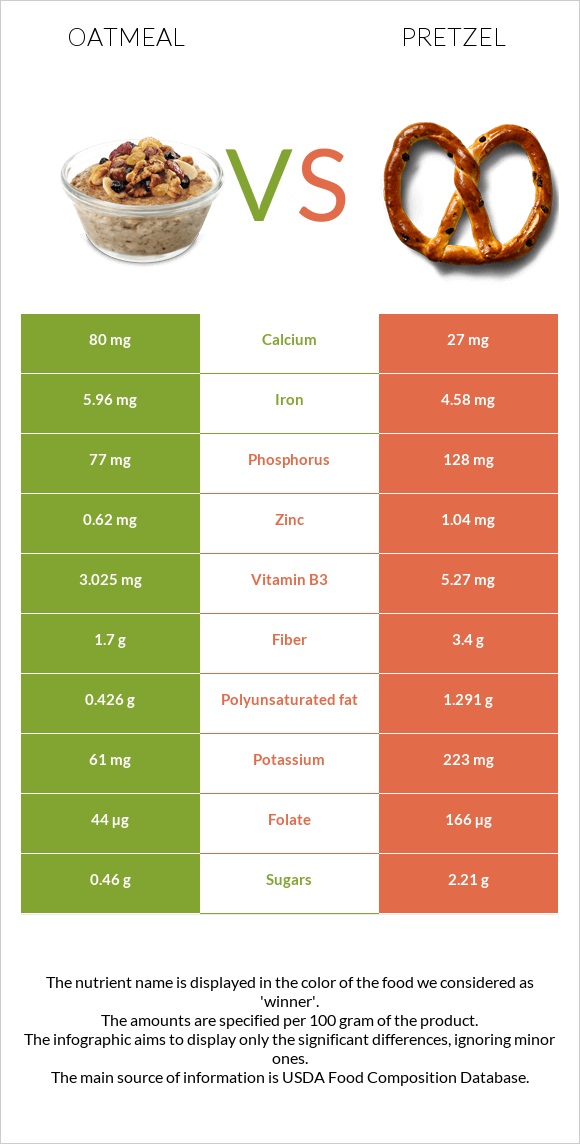Oatmeal vs. Pretzel — In-Depth Nutrition Comparison
Compare
Significant differences between oatmeal and pretzel
- Oatmeal has more iron, vitamin B6, and vitamin A; however, pretzel is richer in folate, manganese, vitamin B3, vitamin B1, copper, and vitamin B2.
- Pretzel covers your daily sodium needs 52% more than oatmeal.
- Oatmeal contains less sodium.
Specific food types used in this comparison are Cereals, oats, instant, fortified, plain, prepared with water (boiling water added or microwaved) and Snacks, pretzels, hard, plain, salted.
Infographic

Infographic link
Mineral Comparison
Mineral comparison score is based on the number of minerals by which one or the other food is richer. The "coverage" charts below show how much of the daily needs can be covered by 300 grams of the food.
| Contains more CalciumCalcium | +196.3% |
| Contains more IronIron | +30.1% |
| Contains less SodiumSodium | -96% |
| Contains more SeleniumSelenium | +13.6% |
| Contains more MagnesiumMagnesium | +11.5% |
| Contains more PotassiumPotassium | +265.6% |
| Contains more CopperCopper | +136.4% |
| Contains more ZincZinc | +67.7% |
| Contains more PhosphorusPhosphorus | +66.2% |
| Contains more ManganeseManganese | +81.9% |
Vitamin Comparison
Vitamin comparison score is based on the number of vitamins by which one or the other food is richer. The "coverage" charts below show how much of the daily needs can be covered by 300 grams of the food.
| Contains more Vitamin AVitamin A | +∞% |
| Contains more Vitamin B6Vitamin B6 | +291.9% |
| Contains more Vitamin CVitamin C | +∞% |
| Contains more Vitamin EVitamin E | +571.4% |
| Contains more Vitamin B1Vitamin B1 | +63.1% |
| Contains more Vitamin B2Vitamin B2 | +54.4% |
| Contains more Vitamin B3Vitamin B3 | +74.2% |
| Contains more Vitamin KVitamin K | +600% |
| Contains more FolateFolate | +277.3% |
All nutrients comparison - raw data values
| Nutrient |  |
 |
DV% diff. |
| Sodium | 49mg | 1240mg | 52% |
| Folate | 44µg | 166µg | 31% |
| Starch | 10.37g | 72.58g | 26% |
| Carbs | 11.67g | 80.39g | 23% |
| Manganese | 0.558mg | 1.015mg | 20% |
| Iron | 5.96mg | 4.58mg | 17% |
| Vitamin B6 | 0.29mg | 0.074mg | 17% |
| Calories | 68kcal | 384kcal | 16% |
| Protein | 2.37g | 10.04g | 15% |
| Vitamin A | 130µg | 0µg | 14% |
| Vitamin B1 | 0.26mg | 0.424mg | 14% |
| Vitamin B3 | 3.025mg | 5.27mg | 14% |
| Copper | 0.066mg | 0.156mg | 10% |
| Vitamin B2 | 0.215mg | 0.332mg | 9% |
| Fiber | 1.7g | 3.4g | 7% |
| Phosphorus | 77mg | 128mg | 7% |
| Polyunsaturated fat | 0.426g | 1.291g | 6% |
| Calcium | 80mg | 27mg | 5% |
| Potassium | 61mg | 223mg | 5% |
| Choline | 4.7mg | 29.5mg | 5% |
| Zinc | 0.62mg | 1.04mg | 4% |
| Vitamin E | 0.07mg | 0.47mg | 3% |
| Fats | 1.36g | 2.93g | 2% |
| Vitamin C | 0mg | 2.1mg | 2% |
| Vitamin K | 0.4µg | 2.8µg | 2% |
| Magnesium | 26mg | 29mg | 1% |
| Selenium | 5µg | 4.4µg | 1% |
| Saturated fat | 0.226g | 0.391g | 1% |
| Monounsaturated fat | 0.391g | 0.727g | 1% |
| Net carbs | 9.97g | 76.99g | N/A |
| Sugar | 0.46g | 2.21g | N/A |
| Vitamin B5 | 0.317mg | 0.322mg | 0% |
| Trans fat | 0.003g | 0.004g | N/A |
| Tryptophan | 0.04mg | 0.097mg | 0% |
| Threonine | 0.083mg | 0.25mg | 0% |
| Isoleucine | 0.105mg | 0.407mg | 0% |
| Leucine | 0.2mg | 0.757mg | 0% |
| Lysine | 0.135mg | 0.257mg | 0% |
| Methionine | 0.04mg | 0.177mg | 0% |
| Phenylalanine | 0.13mg | 0.52mg | 0% |
| Valine | 0.151mg | 0.48mg | 0% |
| Histidine | 0.057mg | 0.22mg | 0% |
| Fructose | 0g | 0.31g | 0% |
| Omega-3 - ALA | 0.063g | N/A | |
| Omega-6 - Gamma-linoleic acid | 0.001g | N/A | |
| Omega-6 - Linoleic acid | 1.223g | N/A |
Macronutrient Comparison
Macronutrient breakdown side-by-side comparison
| Contains more WaterWater | +2584.7% |
| Contains more ProteinProtein | +323.6% |
| Contains more FatsFats | +115.4% |
| Contains more CarbsCarbs | +588.9% |
| Contains more OtherOther | +515.8% |
Fat Type Comparison
Fat type breakdown side-by-side comparison
| Contains less Sat. FatSaturated fat | -42.2% |
| Contains more Mono. FatMonounsaturated fat | +85.9% |
| Contains more Poly. FatPolyunsaturated fat | +203.1% |
Carbohydrate type comparison
Carbohydrate type breakdown side-by-side comparison
| Contains more SucroseSucrose | +∞% |
| Contains more GalactoseGalactose | +∞% |
| Contains more StarchStarch | +599.9% |
| Contains more GlucoseGlucose | +∞% |
| Contains more FructoseFructose | +∞% |
| Contains more MaltoseMaltose | +∞% |
~equal in
Lactose
~0g





